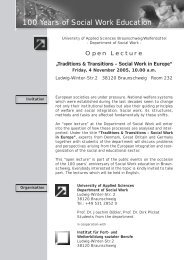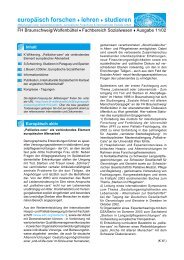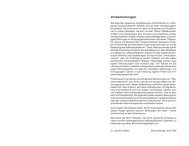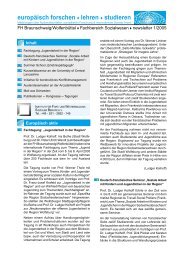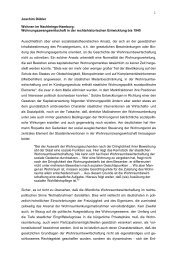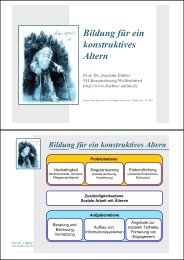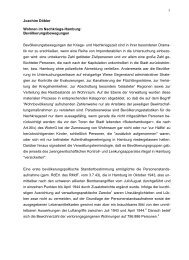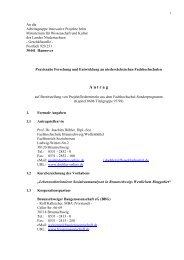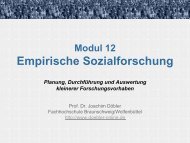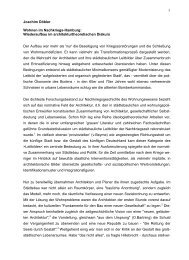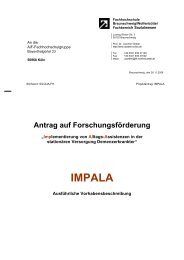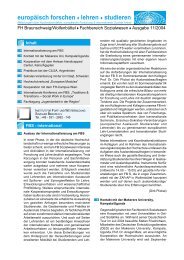CONTRIBUTIONS TO THE BOLOGNA PROCESS - Doebler-online.de
CONTRIBUTIONS TO THE BOLOGNA PROCESS - Doebler-online.de
CONTRIBUTIONS TO THE BOLOGNA PROCESS - Doebler-online.de
You also want an ePaper? Increase the reach of your titles
YUMPU automatically turns print PDFs into web optimized ePapers that Google loves.
12officers to assess them. The Diploma Supplement helps situating a qualification withinthe education system to which it belongs.The ECTS (European Credit Transfer System), <strong>de</strong>veloped by the EuropeanCommission, facilitates the transfer of credits obtained during periods of study abroad tothe home institution (or another institution), so that stu<strong>de</strong>nts will not “lose” by doing partof their work for a <strong>de</strong>gree at a foreign institution.The ENIC and NARIC Networks provi<strong>de</strong> an important forum for the <strong>de</strong>velopment ofEuropean recognition policies and practice as well as for cooperation between individualinformation centres. The two Networks cooperate very closely and hold joint annualmeetings as well as joint meetings of the ENIC Bureau and the NARIC Advisory Board.The ENIC Network also has a statutory role in the implementation of the LisboaRecognition Convention. The NARIC Network encompasses the countries of theEuropean Union and the European Economic Area as well as the Associated Countries.The ENIC Network encompasses all NARICs as well as all parties to the EuropeanCultural Convention (Council of Europe), members of the UNESCO Europe Region,parties to the Lisboa Recognition Convention and/or parties to the UNESCO RegionalConvention for Europe. The ENIC Network therefore covers all countries of Europe 2 aswell as Australia, Canada, Israel and the United States of America. While aca<strong>de</strong>micrecognition is the main area of activity of both networks, many NARICs also function ascontact points for the EU Directives on professional recognition.The Recommendation on International Access Qualifications, primarily <strong>de</strong>veloped byUNESCO/CEPES and adopted by the Lisboa Recognition Convention Committee in June1999, will facilitate the recognition of school leaving qualifications not belonging to anational education system for the purpose of access to higher education.Two important initiatives are also un<strong>de</strong>r preparation: a draft Co<strong>de</strong> of Good Practice inthe Provision of Transnational Education, <strong>de</strong>veloped by a working party for whichUNESCO/CEPES provi<strong>de</strong>d the main Secretariat, and a draft Recommendation onCriteria and Procedures for the Assessment of Foreign Qualifications and Periods ofStudy, for which the Council of Europe provi<strong>de</strong>d the main Secretariat. It is hoped thatboth texts may be submitted to the Lisboa Recognition Convention Committee foradoption in 2001.A number of other ENIC working parties have addressed specific recognition issues. Inaddition to those which have led to proposals for standard setting texts, such as ontransnational education or criteria and procedures, these inclu<strong>de</strong> the working parties onEuropean – US recognition, Russian education, the recognition of qualifications held byrefugees and the NEED group. The latter, active in the early 1990s, elaborated a firstoverview of the education and qualifications systems of the countries of Central and2 Following the political changes in Serbia from October 2000, the Fe<strong>de</strong>ral Republic of Yugoslavia isexpected to join the ENIC Network in the near future. The Fe<strong>de</strong>ral Republic of Yugoslavia has now beenadmitted as a member of UNESCO and has been invited to acce<strong>de</strong> to the European Cultural Convention ofthe Council of Europe.



